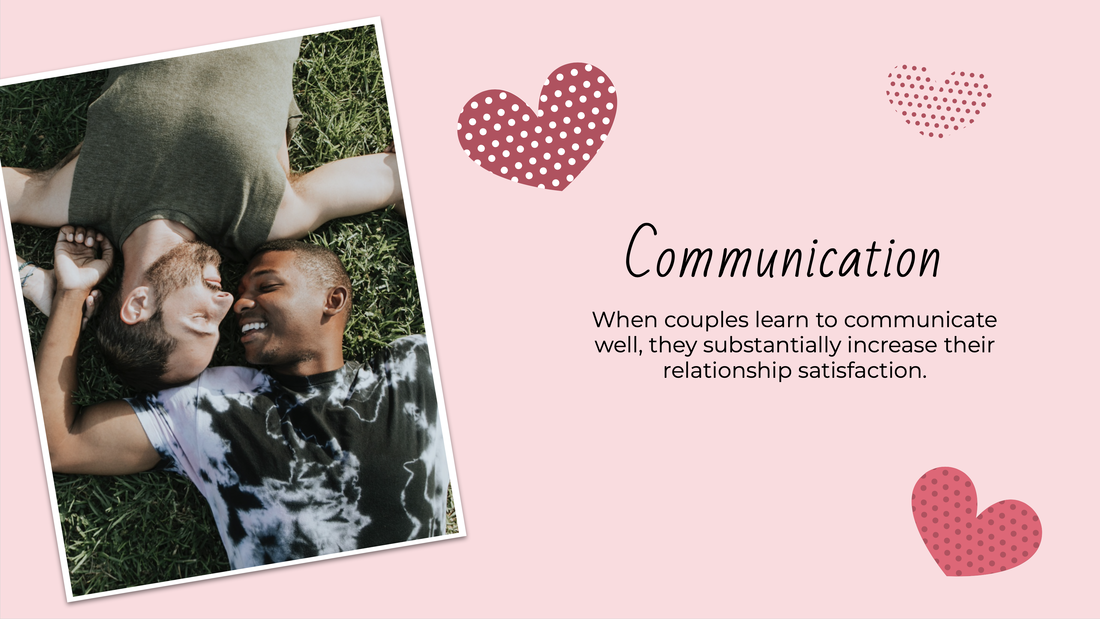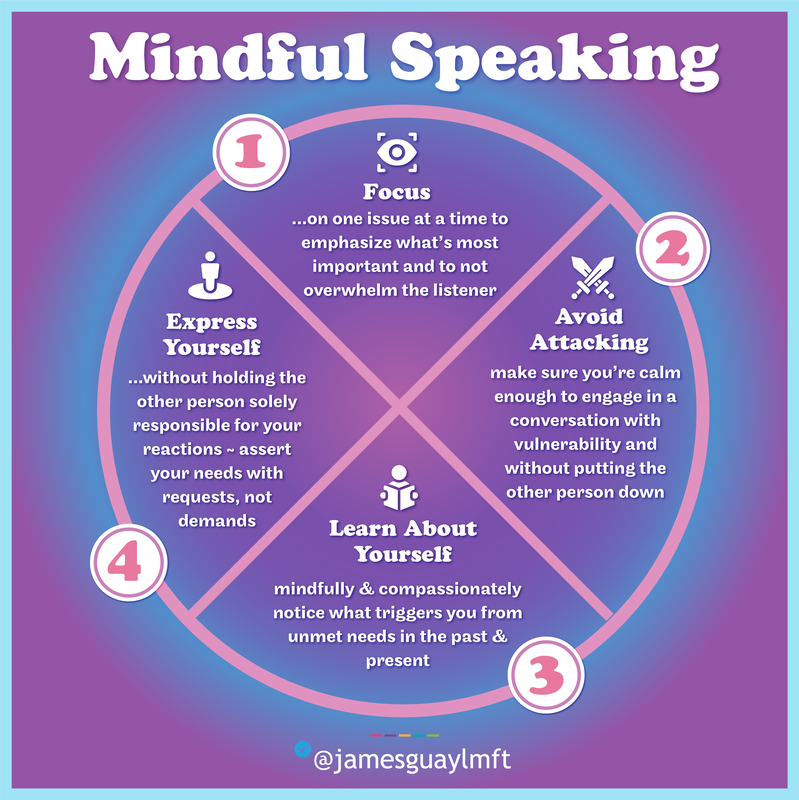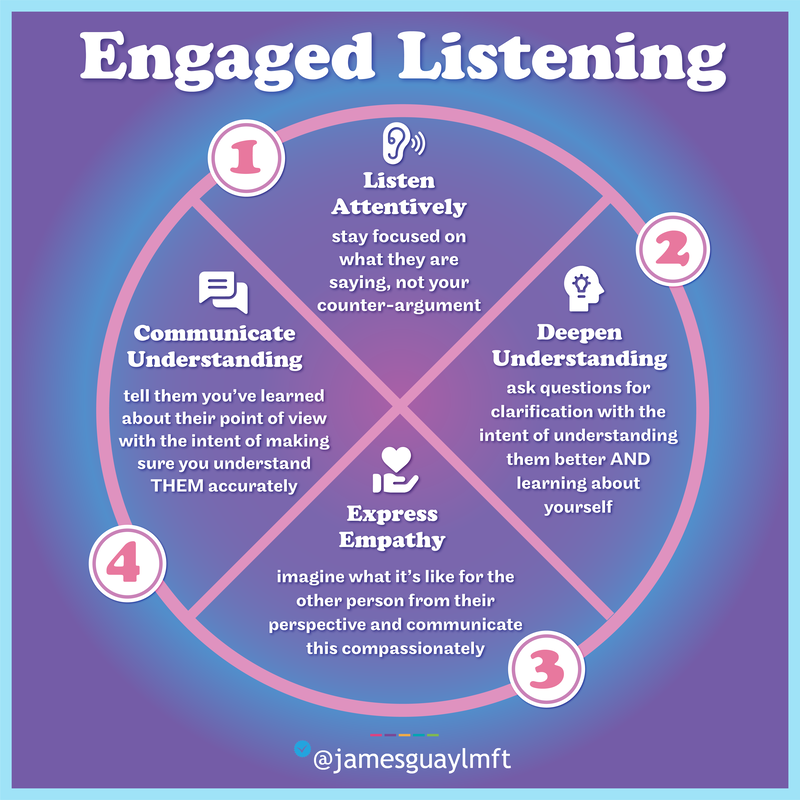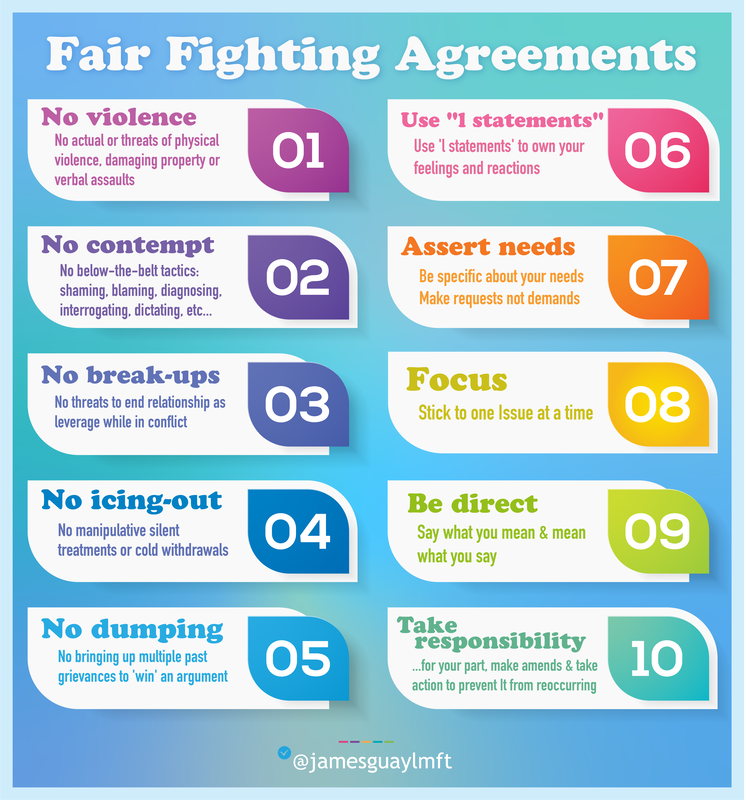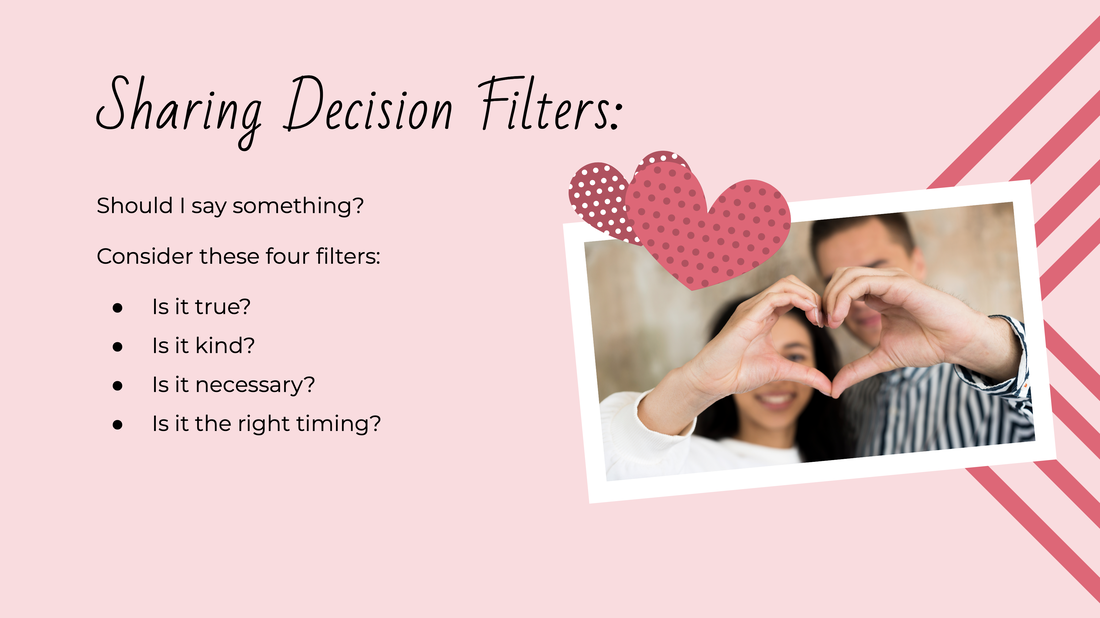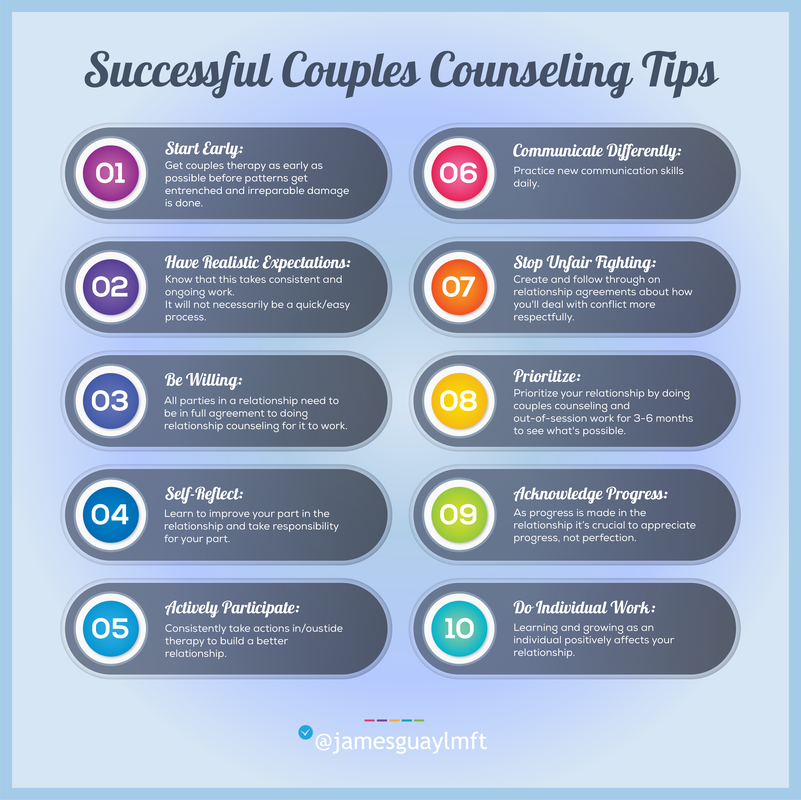Couples Online Therapy
Couples Communication
Most couples come in to therapy interested in improving the way they communicate with each other and resolve conflict. Some couples have high conflict while others are conflict avoidant. In either case, learning to speak more effectively can dramatically improve the health of your relationship(s).
Being a Mindful Speaker
- Focus: Staying focused on one issue at a time is essential to not overwhelm who you're speaking to. It's also a way of prioritizing what's most important to say so this gets heard more easily.
- Avoid Attacking: Make sure you're calm enough to engage in a conversation without attacking each other. Attacking someone's character, demeaning them, expressing contempt and name calling are all likely to put the other person on the defensive in addition to being destructive to relationships.
- Learn About Yourself: Take this opportunity of conflict or disagreement to learn more about yourself. Notice what your triggers are and how past experiences impact the present. Be open to discovering something about yourself that you weren't previously aware of.
- Express Yourself: Express your thoughts, feelings and needs without holding the other person solely responsible for your reactions. Use "I" statements as a way of taking responsibility for your own internal landscape.
| Mindful Speaking.pdf | |
| File Size: | 194 kb |
| File Type: | |
Better Listening
When we feel heard, valued and cared for we develop greater intimacy with others.
- Listen Attentively: Too often we can spend more time coming up with our rebuttal than actually listening and empathizing with what someone else is saying. Let go of defending or arguing for a moment and focus on understanding and caring about the other person's experience.
- Deepen Understanding: Allow yourself to be curious about the other person's experience, stepping inside their shoes for a moment, understanding things from their perspective. Ask questions that are honestly geared toward getting clarity, not sharing your perspective quite yet.
- Express Empathy: Express with your words and non-verbal communication that you understand and care about the other person's experience. Making appropriate eye contact (based on cultural and relational norms for that person), and showing you care with your facial features, body posture, and space between you and the speaker, can go a long way to resolving conflict and developing greater intimacy.
- Communicate Understanding: Now it's time to communicate what you believe you heard and understood from the other person to see if you got the main points. It's also a time to see if you understood what was most important to them. Use some of their words with a mixture of your own.
| Engaged Listening.pdf | |
| File Size: | 193 kb |
| File Type: | |
Be as passionate about listening as you are about wanting to be heard.
– Brené Brown
Creating Fair Fighting Agreements
Having conflict and resolving it well helps build intimacy in relationships. It lets us know what's important to the other person, what's important to us, and gives us a chance to express ourselves so that there can be greater understanding, care and compromise. But there are ways that conflict can be destructive too.
Creating fair fighting agreements in relationships can keep us on track. Be mindful of the other person's cultural background/family norms et al. I recommend you schedule a time and sit down with your partner when you both are calm enough and generally in a good place. You can create a list individually (sharing afterwards) or collaboratively at the same time.
Creating fair fighting agreements in relationships can keep us on track. Be mindful of the other person's cultural background/family norms et al. I recommend you schedule a time and sit down with your partner when you both are calm enough and generally in a good place. You can create a list individually (sharing afterwards) or collaboratively at the same time.
Here are some examples:
- No violence: No threats of or actually violence, damaging property or verbal assaults
- No contempt: No expressions of superiority, disdain, condescension or shame
- No threats of breaking-up: No threats to end the relationship while in the heat of conflict
- No icing out: No manipulative silent treatments or cold withdrawals
- No dumping: No bringing up multiple past grievances to "win" an argument
- Use "I Statements": Speak about your own personal feelings and reactions using "I statements."
- Assert needs: Be specific about your needs. Make requests, not demands.
- Focus: Stick to one issue at a time
- Be genuine & direct: Say what you mean and mean what you say.
- Take responsibility: Take responsibility for your part by offering a true apology when appropriate.
| Fair Fighting Agreements.pdf | |
| File Size: | 308 kb |
| File Type: | |
When Should I Share Something?
There is so much conflict in the world made worse by violent speech. An antidote to this is sharing mindfully. This isn’t about censoring all speech but rather being more selective and considered. Mindful speech is also impactful speech in addressing what really matters and needs to be said.
When considering whether to share something, use these 4 filters:
When considering whether to share something, use these 4 filters:
- Is it True? (Is it a lie, deceit, or gossip you hear second-hand?)
- Is it Kind? (Is it caring for yourself or others even if it's uncomfortable or impactful?)
- Is it Necessary? (Is sharing needed to repair, maintain, deepen or end your relationship?)
- Is it Well Timed? (Is it a good enough time to share, even if there's no perfect time to do so?)
Couples Counseling Improves Relationships
Have you ever been curious if couples counseling could improve your relationship? Do you want outside help to create a better relationship or to end your relationship amicably? Whether you’re in a high-conflict or conflict-avoidant relationship, whether you’re interested in rebuilding trust, communicating more effectively, or deepening vulnerability and intimacy with your partner(s), couples counseling with the right therapist and the right conditions, can be very effective.
Couples Counseling: Top 10 Tips
- Start Early: The more you can be pro-active and prevent future harm, the better. Get couples therapy as early as possible before patterns get entrenched and irreparable damage is done.
- Have Realistic Expectations: Know that this takes consistent and ongoing work. It won’t necessarily be a quick and easy process. A hoped for expectation can be that therapist will side with you in pointing out all of your partner’s flaws and naming you the good/right one. This isn’t how couples therapy works.
- Be Willing: All parties in a relationship need to be in full agreement to doing relationship counseling for it to work best. You can’t force your partner to do something against their will and expect that it’s gonna work out very well. There needs to be at least partial buy-in and willingness, even if there’s some fear, anxiety or apprehension about beginning. I get that it can be extra vulnerable for many to put ourselves out there for couples counseling because we can’t control what our partner says about us and it’s often not very flattering, but we at least need to give full consent to being uncomfortable at times, for the greater good of improving our relationship.
- Self-Reflect: One of the most frequent things I hear, especially in the beginning of couples therapy, is blame. All parties in a relationship need to take full responsibility for their part in where their relationship is at, not take ownership of what the other person is responsible for and be open to learning more about themselves.
- Actively Participate: Consistently take actions in/outside of therapy to build a better relationship. Couples may only meet once/week with a therapist so there needs to be active participation in improving the relationship outside of session too.
- Communicate Differently: Practice new communication skills daily to build strength in doing them when they’re needed most. It’s kind of like building muscles or endurance at the gym. It takes regular practice to do so.
- Stop Unfair Fighting: Unfair fighting damages our relationships. Creating and following through on relationship agreements, can dramatically improve a high-conflict and/or hostile relationship, or at least make it safer to BE in a particular relationship.
- Prioritize: Prioritize your relationship by doing couples counseling and out-of-session work for at least 3-6 months to see what’s possible. If nothing else, you know you’ve done due diligence in trying to repair/improve your relationship and you’ve hopefully developed new skills that can better all your relationships — with co-workers, friendships, family and others.
- Respect No-Secrets Policy: Don’t share secrets with your therapist that you don’t want shared with your partner(s). This allows for everyone to be operating with the same information, to do collaborative work. Part of my No-Secrets Policy is that whatever information is shared with me privately — in-person, text, fax, email, voicemail — is shared with your partner at the next available scheduled appointment. Otherwise, things can get way too complicated and detract from making progress in therapy.
- Do Individual Work: Learning and growing as an individual positively affects your relationship. Individual work can include a meditation/yoga practice, mindfulness in everyday life, individual therapy or any particular method that helps YOU get to know yourself better and live more authentically/compassionately in the world. This is an ongoing process we’re hopefully doing for the rest of our lives.
| successful_couples_counseling.pdf | |
| File Size: | 198 kb |
| File Type: | |
